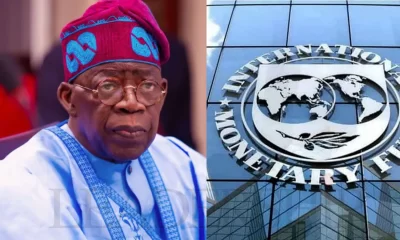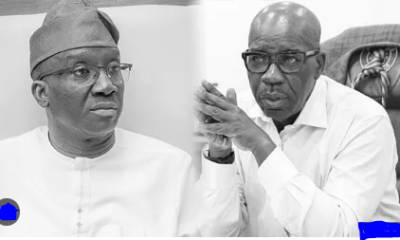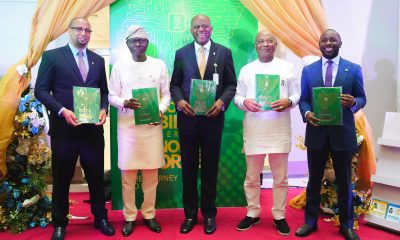Business
Is IMF taking Nigeria to promised land?
Published
4 years agoon
By
Publisher
By Marcel Okeke
The title of this article was provoked by two factors; and each of them is worrisome. First is the vociferous pronouncements of what are called the Bretton Woods Institutions on practically every facet of life in Nigeria, especially in recent times. These days, hardly any day passes without the World Bank and/or the International Monetary Fund (IMF) pontificating on what Nigeria must (or must not) do regarding its wobbling economy.
Also read: CBN, export drive and foreign exchange bind
Even when some of their prescriptions would lead to more hardships for most Nigerians, the IMF finds it convenient to ram such unpopular policy options down the throat of the Government of the day. A typical case in point is the IMF’s insistence that fuel subsidy be removed at this time in Nigeria, not minding the very obvious socio-economic and political upheavals the measure would trigger. We shall give more examples down the line.
The second factor that prompted the headline is the shocking content of a video clip that has gone viral, in which a former National Chairman of the People’s Democratic Party (PDP) and former Minister of Agriculture and Rural Development, Mr Audu Ogbeh, spoke about Nigeria’s economic misfortunes.
Also read: High inflation frustrating Nigeria’s economic recovery, World Bank warns
He said the “tragedy of Nigeria” began in 1986, when the country was persuaded by the Bretton Woods Institutions to do Structural Adjustment Programme (SAP) and to devalue its currency (every week) for 32 years. Recalling when the Naira (Nigeria’s local currency) was much stronger than the Dollar and one Naira equalled a Pound Sterling in value, Ogbeh said “we are now where a Dollar exchanges for over five hundred Naira; and they are still telling us that the Naira is overvalued.”
The SAP, Ogbeh said, brought misery and poverty in the land, adding that “interest rates skyrocketed, nobody could build a factory, start a farm or do anything to create employment”. Ogbeh said in that milieu, massive importation of all manner of items became the order of the day!
Also read: Forex sales: CBN puts commercial banks on notice
Now, close to four decades after the introduction of the SAP with its attendant denudation of the Nigerian economy, the IMF and its allies are still calling for the devaluation of the Naira, using arcane languages and technical jargons like ‘exchange rates realignment; merger of exchange rates or adoption of single exchange rate’, etc, yet, shun of these euphemistic expressions, what these global financial institutions and their ilk are calling for is instant and indeterminate devaluation of the local currency—the Naira.
Has the time not come when the IMF and its allies should also be worried about the crashing value of the Naira and how to realistically strengthen it? In other words, should their concern not be how to sustainably improve production and productivity of the Nigerian economy?
The IMF and their henchmen should know that in its current structure, the Nigerian economy is in no shape to reap what are usually the benefits of currency devaluation. Generically, the main advantage of devaluation is to make the exports of a country more competitive, as they become cheaper to purchase as a result.
This can increase external demand and reduce or eliminate trade deficit (in current account). However, a large and rapid devaluation may scare off international investors; it makes them less willing to hold government debt because devaluation effectively reduces the value of their holdings. This has become Nigeria’s plight. But the big question remains: what does Nigeria have to export?
As an almost a mono-product economy (solely dependent on crude oil), even the price and volume of what it has to export are beyond its control, as a member of the Organization of Petroleum Exporting Countries (OPEC) plus allies. Structural, environmental and social challenges also impose rigid constraints on the scale and volume of crude oil production and exports in Nigeria.
When all these are factored into the import-dependence of the Nigerian economy and most Nigerians’ high taste or preference for imported items, the ever-present albatross of the Nigerian economy gets obvious. Today, paradoxically, even with the high and rising prices of the ‘mono-product’ in the international market (Brent crude at over $100 per barrel) courtesy of the Russia-Ukraine ‘war’, Nigeria feels bad.
This is because the country is in an ineluctable snare in which it cannot refine its crude oil to get the badly needed fuel by its citizenry. It imports the fuel (100 percent of the need) from those to whom it exports the crude oil; so, rising oil prices translates to rising cost of importing fuel. And the already scorching economic challenges would not allow the Government sell the imported fuel at outrageous ‘landing costs’—so, the subsidy debacle lingers.
In all of these, surprisingly, the position of the IMF regarding the ‘abandoned and decrepit’ Government-owned refineries doesn’t seem to be in the public domain. These global financial ‘guardians and guards’ have been around in Nigeria for ages (Nigeria became a member of IMF in 1961) and can be said to have dictated much of the economic policies and direction of the country. Or, are they (IMF & Co.) the ones that guided Nigeria into the present ‘dead end’ of inability to refine crude and continued importation of fuel—leading to unwittingly retaining the much-excoriated subsidy regime? Pointedly, what is the prescription of the IMF regarding Nigeria’s huge wasting assets that the country’s four giant fallow refineries represent?
With this backdrop, the IMF’s seemingly altruistic warning about the implications of Nigerian Government borrowing more money to fund the lingering fuel subsidy appears duplicitous. The IMF said in its recent ‘Nigeria: Selected Issues Paper’ report that “implicit fuel subsidies have a significant negative impact on Nigeria’s fiscal position…,” stressing that the Government would likely depend hugely on domestic financing sources, even as “fuel subsidy has been a substantial burden on the country.”
There is really nothing new in this vapid statement, considering the IMF’s enormous powers to influence and direct Government economic policies across jurisdictions around the globe.
Over the years, the IMF & Co. have become behemoths, with huge influence on various national economies—wielding ‘stick and carrot’ almost in equal measure. Indeed, but for the IMF’s ‘carrot’ in form of ‘Special Drawing Rights (SDRs) windfall worth US$3.35 Billion, Nigeria’s stock of external reserves would have closed last year at a much lower level. SDRs are the IMF’s reserve assets, and are exchangeable for Dollars and some other hard currencies. Around the third quarter 2021, the IMF approved and disbursed SDR equivalent of US$650 Billion to “boost global liquidity” in dealing with the devastating effects of the Corona virus pandemic.
Thus, the IMF as a benefactor to many countries including Nigeria, also must exercise the moral right not to allow situations get too bad, before raising the alarm or intervening—as is the case in Nigeria of today.
Yes, it makes a lot of economic sense to call for removal of fuel subsidy, as the IMF is doing, but the socio-economic and political backlash of such a move would be too grave to imagine. In a pre-general election year (in Nigeria), is it politic or expedient to remove fuel subsidy that has been around for many years?
Why has the IMF and others not been as insistent and vehement in their calls for the termination of the subsidy regime as they have become in recent times? Did they just suddenly discover that the subsidy process is opaque and a cesspool of corruption?
As Nigeria moves closer to the silver jubilee of it democracy (in 2024), entities like the IMF that have ‘oversight’ powers on her economy should be more audacious and proactive. Moral suasion or mere lamentation, as the IMF seems to be applying at present, can certainly not take Nigeria to its ‘Promise Land’ or economic Eldorado. The global financial behemoth has been around (in Nigeria) for too long to allow the naturally well-endowed country be trapped interminably in some miasma!
- Mr Okeke, an Economist, Sustainability expert and Consultant on Business Strategy, He can be reached at: [email protected]
You may like


Nigeria pays Off $3.4 Billion IMF Covid-19 loan, exits debtor list


Nigeria’s debt rises to N74.38trn, $44.9bn despite IMF loan repayment


Obaseki slams Okpebholo’s allegations, Urges focus on Governance


Sanwo-Olu attends CBN symposium of economic reforms


IMF clarifies stance on Nigeria’s fuel subsidy removal amid rising economic challenges


CBN reaffirms commitment to financial system stability
Trending

 Health6 days ago
Health6 days agoDeclassified CIA memo explored concealing mind-control drugs in vaccines

 Entertainment1 week ago
Entertainment1 week agoSimi addresses resurfaced 2012 tweets amid online backlash

 Crime7 days ago
Crime7 days agoSenior police officers faces retirement after Disu’s appointment as acting IGP

 Comments and Issues1 week ago
Comments and Issues1 week ago20 Critical Fixes to Save Nigeria’s Democracy from Electoral Fraud

 Latest1 week ago
Latest1 week agoICPC yet to respond to El-Rufai’s bail request as arraignment date looms

 Football1 week ago
Football1 week agoMartínez ruled out of Everton clash with calf injury

 Comments and Issues1 week ago
Comments and Issues1 week agoGovernance Before Guns: Why Institutional Coherence Determines Security Outcomes

 Comments and Issues1 week ago
Comments and Issues1 week agoWho owns Abacha’s loot? Nigeria and the fight for the people’s money

